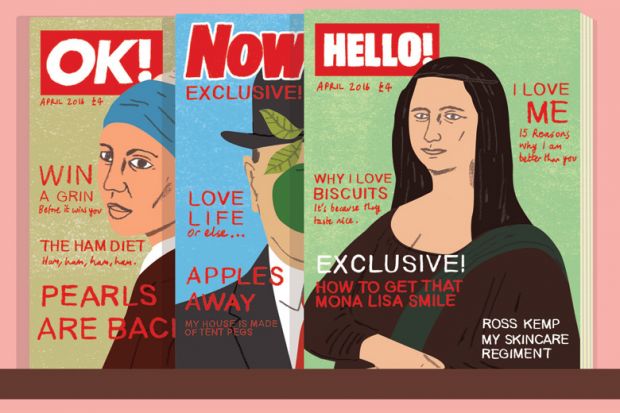Venus looks a lot like Paris Hilton in photographer David LaChapelle’s colour-saturated, kitsch-pop homage to Botticelli, titled Rebirth of Venus. She is a sun-kissed, gazelle-thin waif, with bleached blonde tresses floating in the breeze and a vacant expression drifting across her face.
This 2009 image is one of several contemporary takes on the original Birth of Venus to be seen in the first room of an exhibition at London’s Victoria and Albert Museum. Botticelli Reimagined boldly repackages the 15th-century painter of chubby cherubs and gambolling nymphs for a 21st-century audience. It is a perplexing, riotous ragbag of a show, beginning with a medley of images that reflect Botticelli’s wide-ranging influence on contemporary fashion, film and photography, taking us back to his Victorian revival at the hands of devoted Pre-Raphaelites, before finally depositing us in the Renaissance with a decent body of the artist’s own work and its context. It’s a high-octane and terrifically fun experience, perhaps all the better for the quirky connections it tries to make.
Drawing out how the past bears on the present is also a habit familiar to academics. We fumble around in the sea of contemporary culture, clutching at references and inferring influences that might magically make teaching feel relevant. “Relevance” is one those mysterious and cursed R-words, nicely sandwiched between “REF” (research excellence framework) and “Reply All emails” in the Dictionary of Things All Academics Hate. Perhaps some of you are braver than I, not yielding one whit to the demand that research be made relevant to the baying crowds. You admirable fiends. For my own part, I can only lament the folly of a recent lecture on the late Romantic drug-taker and dilettante, Thomas De Quincey, where I compared his 1821 Confessions of an English Opium Eater to Russell Brand’s My Booky Wook. Ditto the one the week before, when I hazarded a thought that William Blake’s fantastical poetic epic of 1794, The Book of Urizen, might resemble the hit HBO TV series Game of Thrones (which I admit that I have never seen).
The success of Botticelli Reimagined suggests that the impulse to make things relevant or somehow contemporary is not always facile. In teaching, too, it is extraordinarily gratifying when students make sense of the work we offer on their own terms, in ways that engage with the context of their lives. And yet my own disastrous efforts at “updating” make me think that there is also a particular dignity in the refusal to sex up and dumb down our thinking: in the insistence that intellectual endeavour is of value in its own terms. We might have greater faith in the natural curiosity and discernment of students who don’t need a reference to Kim Kardashian to make Kant interesting.
This impulse to be “relevant” is perhaps symptomatic of a greater existential crisis in the academy, where so many disciplines seem to be fending off demands that they prove their worth, and where universities in general are obliged to demonstrate their utility. We squirm at the notion of an intellectual culture in which the “use value” of research must be made immediately apparent because it seems so antithetical to the spirit of discovery that scholarship cherishes.
Something in those arguments reminds me, ruefully, of those moments in school maths lessons when some malcontent or other would protest, darkly prophesying the uselessness of algebraic equations for the purposes of the “real life” they imagined just over the horizon. And while it’s true that I haven’t yet found occasion to hit the Sin, Cos or Tan buttons on my calculator in adulthood, I cannot say that I regret the smidgeon of understanding I did manage to pick up, nor the respect I acquired for colleagues who research in maths, physics, engineering and architecture departments. Who knows how useful the things we learn turn out to be? And who has the right to decide?
Perhaps the opposite of a “useful” and determinedly relevant education is a more open and disinterested kind of learning, rich with the possibility of unexpected discovery. Realising that possibility is one of the essential imperatives behind research. I recognise it most particularly in the hand-wringing anxiety of PhD candidates who come to us with second thoughts, hesitating on the brink of a decision that might take them wildly off course. In those moments, I usually feel wizened enough by experience to reassure them that the objects of our knowledge can change, and that research – certainly in the arts and humanities – calls for the courage to pursue surprising lines of enquiry.
In the last room of the Botticelli Reimagined show there is what art historians suspect is a self-portrait of the artist as a young man. He looks out over his shoulder, directly meeting the viewer’s gaze, pugnacious and evaluative, as though thoroughly unimpressed at the manhandling of his work by centuries of painters, photographers and fashion designers. But it’s too late: who could have predicted that Venus would step out of the scallop shell and into Dolce & Gabbana dresses, Italian sports-car hubcaps and Bond films? And it seems impossible to predict where she’ll go next.
Shahidha Bari is lecturer in Romanticism at Queen Mary University of London.
POSTSCRIPT:
Print headline: Venus, born and reborn
Register to continue
Why register?
- Registration is free and only takes a moment
- Once registered, you can read 3 articles a month
- Sign up for our newsletter
Subscribe
Or subscribe for unlimited access to:
- Unlimited access to news, views, insights & reviews
- Digital editions
- Digital access to THE’s university and college rankings analysis
Already registered or a current subscriber? Login




